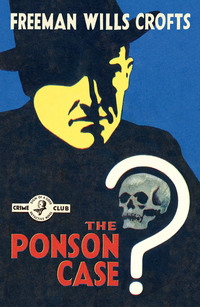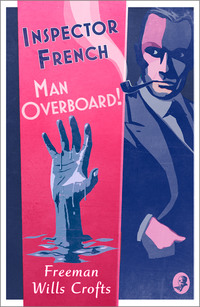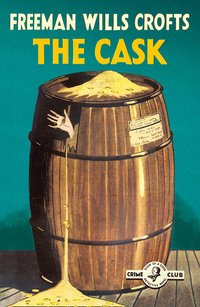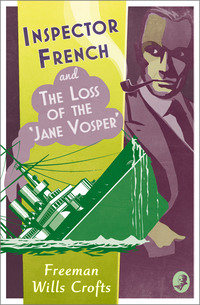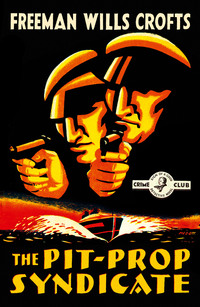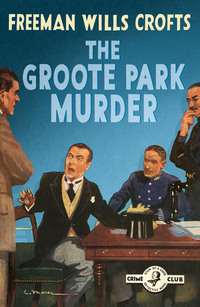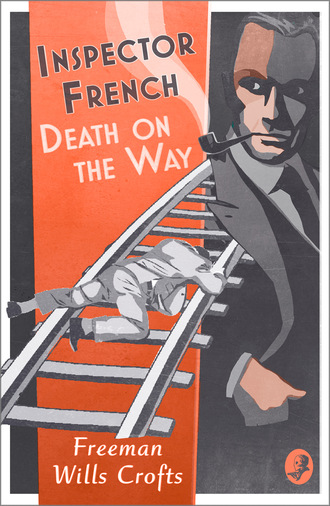
Полная версия
‘Are you coming down to the hockey on Saturday?’ Ackerley asked as they stepped on the path.
Parry was pursuing thoughts of his own and did not want to talk about hockey. Vaguely he was aware of the white rocks on the right, sloping up out of sight above him, and on the left dropping quickly down to the foaming surf far below; of the race of white horses out on the heaving waters; of the wheeling sea birds with their melancholy cries. Vaguely he heard that the Redchurch goalkeeper was about as much use as a performing poodle; that Brenda played a better game than Mollie; and that Whitness would have to wake up and get busy if they were going to retain the cup. He wasn’t interested, but he managed to reply with reasonable intelligence, and Ackerley speedily reverted to his customary shop.
They regained the railway at the Redchurch end of the tunnel, where for some hundreds of yards the line ran along a narrow shelf cut in the sheer cliff. Another half-mile brought them to Cannan’s Cutting. A glance at the slip showed that no further movement had taken place and the men walked on to the end of the cutting where began a wide bay, Browne’s Bay. At this point the work of the Widening was well under way. The base of the clay slope had been pushed out into the sea, and the new work was in process of being protected by stone pitching. Here it was that doubt had arisen as to the area completed.
‘That’s what you’ve got to measure.’ Ackerley indicated the half-completed work immediately above the line of breaking waves. ‘You’ll get a bath if you’re not careful. Start at this mile-post and work towards Whitness. You needn’t be too accurate: pacing’ll be near enough. Cheerio, then. See you at Redchurch.’
As in the days afterwards Parry thought over that parting, two things came back vividly to him, little things both of them, but significant. The first was the glimpse that he had had of Ackerley’s ring. When Ackerley had said, ‘That’s what you’ve got to measure,’ he had pointed with his left hand, and even in the dusk the glint of the stone in the ring had caught Parry’s eye. Ackerley wore it on his little finger and Parry had seen it hundreds of times. It was a plain gold band bearing one small ruby, set in the simplest way without any chasing or ornamentation. Parry had often wondered why his companion wore it, but he had never asked, and Ackerley had seemed unconscious of its presence.
The second thing which Parry noticed was Ackerley’s extraordinary fitness and good spirits. As he moved off he stepped out briskly with all the energy and vigour of a healthy young animal. He was whistling, too, something light and popular that went with a swing.
Bidding goodnight to the ganger of the length, who passed at that moment, Parry turned towards the pitching.
2
Tragedy
The Redchurch-Whitness Widening was a moderately big job, involving some heavy works. The main line of this particular area of the Southern Railway ran eastwards from Lydmouth, one of the most important watering-places on the south coast, till it joined the Exeter-Waterloo line about half-way between Templecombe and Salisbury. For the first fifteen miles, from Lydmouth to Redchurch, it ran along the shore, but at Redchurch it turned inland. Redchurch was a smaller but more fashionable resort, beloved of the Thank-goodness-it-hasn’t-yet-been-spoiled-by-trippers type.
At Redchurch a line diverged from the direct London line, continuing eastwards along the coast through Whitness, and eventually reaching Bournemouth and Southampton. This line was double all the way except for one section, the three and a half miles stretch between Redchurch and Whitness. Here the cost of doubling had up till now been considered prohibitive. Very heavy earthworks and sea defences had to be dealt with, as well as widening nearly a quarter of a mile of tunnel and building a new viaduct. It was estimated that the cost would be upwards of a quarter of a million sterling.
These three miles of single line, however, had grown increasingly inconvenient. The stretch acted as a bottle neck which slowed up the traffic, causing endless delays and vexation. Though the times were so unsuitable for borrowing new capital, ’bus competition had forced the directors’ hands and a contract for £320,000 had been let. Work had now been in progress for nearly a year.
When Parry arrived back at the engineers’ hut he was more than a trifle breathless. He had underestimated the time it would take him to carry out what he had to do, and had had to hurry back as fast as he could. He did not wish to miss the ballast engine, and there was not much time to give Bragg his information and get the certificate completed before the engine was due. Parry was glad when he came in view of the lighted windows of the hut, shining like harbour beacons in the night.
He hurried to the door. Bragg was still bending over the certificate.
‘Well?’ Bragg grunted without looking up. ‘What about that pitching?’
Parry threw his notebook down on the desk. ‘I’m frightfully sorry, Bragg, the mistake was mine after all. I paced the thing over and every figure seemed to check out, then at last I found it. Pole and I measured it correctly, but I misread a figure in my book. The correct figure was 327 and I read it 827.’
‘Then Pole’s total is correct?’
‘Yes. I’m not trying to make excuses, but what really happened was that my book got wet and the figures weren’t easy to read.’
‘That’s all right. Read me out the total. I’ve finished your earthwork.’
‘Oh, good man, Bragg. Very decent of you.’
The entry of the pitching item completed the certificate. Bragg quickly monied it out, then added the total to that he had already obtained and signed the document.
‘Get a sheet of brown paper, will you?’ he said as he rolled up the papers and slipped a rubber band round them.
Parry produced paper and string, and the certificate and its attendant papers were parcelled up and labelled.
‘You’re going somewhere with Ackerley?’ Bragg went on.
‘Yes, to a dance.’
‘Well, you’ll have time to hand this over to the parcels people in Redchurch to send to the office. I don’t want to bother taking it round. Come on, Parry. We’d better look sharp or we’ll miss that blessed engine.’
Parry nodded. A moment later the two men were walking towards the wicket gate in the contractors’ fence, put in close to the railway hut for their special convenience. This led out on to a branch road which passed through a little spinney behind the yard.
‘For once I remembered my torch,’ Bragg went on as a little circle of light began to play over the ground in front of them.
‘It’s not dark,’ Parry declared. ‘It’s only coming out of the light makes it seem so.’
‘The torch is a help when you’re looking for a keyhole, young Parry.’
They passed through the gate and reached the line. As Parry had said, it was not dark. The sky was heavily overcast, but behind the clouds there was a moon, and objects remained dimly visible. Though it was some time since the rain had stopped, the grass was still dripping and there were pools everywhere. A dull muffled roar came up from the sea, where the waves were dragging the shingle up and down the beach and breaking heavily against the base of the ness.
‘Here she is,’ said Parry.
From the direction of the station appeared lights, slowly diverging and growing brighter. Presently there showed behind them a dark mass, which resolved itself into the smoke-box of an approaching engine. Bragg showed his torch and with a clap the brakes went on, eased off and clapped on again. The boiler slid slowly past and the machine came to rest with the dimly lighted cab just above them. The fireman, a gauge lamp in his hand, stooped down and with a spongecloth gave a perfunctory rub to the steel handles above the steps. Then, stepping back, he made room for Bragg and Parry to climb up.
The driver was standing with his hand grasping the regulator. When his passengers were aboard he gently opened it, then reaching up to another handle, he gave a tiny whistle. With a faint quiver the engine began to move. A chink of the firebox door was open, and each beat drew the glowing coal up to a white heat which lit cab and crew.
The cab was roomy, as cabs go. Bragg, the most honoured traveller, had moved to the right-hand corner and sat down on the fireman’s seat. Parry stood on the left side behind the driver, looking over his shoulder into the gloom ahead. They were now on the viaduct, and to Parry it seemed that they were hanging in space. To his left was a great gulf, for he was too high over the viaduct parapet to see it, and the nearest object was the shore and the beating waves some seventy feet below him. He grasped the upright rod which supported the roof, lest a jolt of the engine should tip him out, while to leave his hands free he dropped the parcelled certificate into the driver’s box. Then the driver whistled again and with a waft of air which Parry felt at his eardrums, the roof of the tunnel slid back over their heads and the noise increased tenfold.
The experience of passing through the tunnel was impressive. The beam of light from the partly opened firebox door, now continuously white from the rapid beat, shone out on the front of the tender and up above it on to the roof of the cab. From these it was reflected back over the faceplate, or end of the boiler, showing up the maze of pipes and handles, gauges and dials, and bringing out unexpected high lights from polished brass-work. Bragg’s figure, seated in the corner, showed dimly, with the fireman standing shadowy behind him, as Parry himself stood behind the driver. On each side between the tender and the cab the black walls of the tunnel quivered as they hastened by, while above the steam formed into a wide rolling coil, also hurrying backwards like an inverted wake.
Presently Parry turned and once again looked out ahead through the cab window, on which a great drop of water from the roof had just flattened itself. Faintly something curved began to show up. It was the ‘high leg’ or outside rail upon which they were travelling, reflecting dimly from its polished inside edge the light striking in through the approaching mouth of the tunnel. Then, as Driver Blake again whistled, the walls and roof slid back and they were out in the open.
For a few hundred yards they ran along the shelf cut in the cliff, with far below them the white horses showing up in ghostly smears. Then the cliff fell back. Another few hundred yards and they were traversing Cannan’s Cutting, past the slip which had so much upset Ackerley. Then once again along the sea round the big inlet, Browne’s Bay, and so to the next headland.
This next headland, Downey’s Point, was blunt in plan, and the railway, instead of tunnelling or cutting through it, ran round it along by the sea. As they approached it, the line ahead, curving sharply to the right, slid behind the boiler out of sight of Parry and Driver Blake. From the right side of the cab no one happened at the moment to be looking out. The fireman had introduced the picker, or huge hooked poker, into the firebox, and was vigorously raking the fire forward up the sloping firebars. It had been let down very low, in fact to a mere layer of incandescent cinders thinly covering the bars, as the engine had really done work for the day, and after the fire had been cleaned of clinker, would lie banked until the next morning. Bragg, having lit his pipe, was absently watching the operation.
The furnace having been adjusted to the fireman’s satisfaction, he withdrew the picker, its hook now white-hot, and laid it on the tender. A little spurt of flame and smoke sprang up where the glowing point came in contact with the coal, dying away as the iron cooled. Setting the firebox door to stand about an inch open, the fireman withdrew to the side of the cab, put his head out, and gave a perfunctory look ahead.
Parry, who happened to be watching him, saw him suddenly stiffen, for a fraction of a second peer earnestly ahead, and then swing round to the driver with a warning shout: ‘’Old! ’Old! There’s something on the road!’
Parry’s heart leaped as he watched the men’s frantic movements. With one hand Blake threw over the regulator, shutting off steam, while with the other he dashed the vacuum brake handle down to the full on position. Then he whistled, several short sharp blasts. Simultaneously the fireman turned on the steam sanding and closed the firebox door, from which a burst of flames had come, due to the sudden cutting off of the suction from the blast. The engine gave a little shudder and the speed declined so rapidly that Parry had to cling on to the cab pillar to prevent himself from falling forward against Blake. Both Bragg and the fireman were now hanging out of their side of the cab, looking back.
The fireman swung in.
‘We’re over it!’ he cried to Blake, as with a harsh grinding of the brakes and a sudden jerk the engine stopped.
The fireman had unhooked a gauge lamp and was already on the ground. Bragg and Parry followed as quickly as they could, each from his own side.
When Parry reached the ballast he stumbled backward past the tender, slipping about on the rough stones. The fireman was already some thirty yards away along the line, and was standing between the rails, bending over something dark. Instinctively Parry held his breath as he raced to the fireman’s side. When he saw what was there his heart was pounding so that he could scarcely breathe.
The dark mass was a man, or what was left of a man. The engine had passed over him and the resulting injuries were terrible. That he was dead there could be no doubt whatever. Parry felt suddenly sick as he stared speechless.
Then he gave a hoarse cry. This man had been clothed in a waterproof and heavy boots. His left hand was stretched out and on its little finger was a ring, a plain gold band bearing a single ruby …
With a single blistering expletive Parry snatched the torch from Bragg, who had by this time come up, and held it close to the face. The features were only slightly disfigured and were plainly recognisable. This dead body, this awful wreck of what had been a man, this was all that remained of his colleague, Ronald Ackerley.
3
Inquest
Trembling as if from ague, Parry heard faintly the fireman’s awestruck cry, ‘My God, it’s Mr Ackerley!’ and Bragg’s sharp horrified oath. All three, indeed, were overpowered by the ghastliness of the tragedy. And the fact that nothing could be done for the unhappy young man took away the stimulus of the need for instant action.
Presently Bragg swore again and with an obvious effort pulled himself together. ‘He’s gone, poor chap,’ he muttered. ‘We can’t do anything. Here, Atkins,’ he turned to the fireman, ‘help me to lift him clear of the road. You, Parry, cut along and tell Blake what has happened.’
In a dream Parry stumbled back to the engine, realising in a numbed kind of way that Bragg had sent him on this message to save him from seeing more clearly the dreadful details of the tragedy. In a dream he climbed up on to the footplate and began telling the news to Blake. But he scarcely knew what he was saying, and when in the middle of his story Blake crossed the cab and answered someone on the ground, he felt no surprise. Presently he realised that Bragg and the fireman were there. Bragg was speaking from the step.
‘Run in to Redchurch as quickly as you can, Blake,’ he was saying. ‘Tell the stationmaster to have an ambulance sent out. I’ll wait here with the body.’ Bragg paused and looked doubtfully at Parry. ‘I say, Parry,’ he went on hesitatingly, ‘you know the Ackerleys, don’t you? Think you can slip up and tell them? A rotten job, I know. If you don’t feel like it, get Clay to ’phone. Go ahead now.’ He stepped back on to the ballast and Blake once again gave his engine steam.
Parry had already been thinking of the Ackerleys. How could he force himself to take them this awful news? How could he go and see Pearl? She had always ragged Ronnie unmercifully, but Parry knew she idolised him. It would be a knock-out blow for Pearl. And for all of them. Indeed, Parry thought it would be even worse for the old people; Mrs Ackerley so fond of her son, Mr Ackerley so proud of him. How would it be possible to tell them? …
While these thoughts passed through his mind, Parry remained dimly conscious of his surroundings. The engine was now running at a high speed and already Blake had shut off steam for Redchurch and was sounding his whistle to announce his approach to the signalman. The yellow eye of the distant signal came up rapidly and slipped behind, and Blake began to apply the brake. That red light ahead was the outer home and at that, if it did not go off, they must stop. Though he could scarcely face what lay in front of him, Parry was now seized with impatience and felt that any delay would be unbearable. However, when they were still some hundred yards from the signal it changed to green, and Blake, releasing the brake, allowed his engine to coast forward. A further bunch of red lights approached, with a single green one at the extreme left. These drew near, passed slowly behind, and the engine turned gently to the left off the main line, and entering the locomotive yard, came to rest among some dozen of its fellows.
Blake wound his reversing wheel into middle gear. ‘Come on, Mr Parry,’ he said. ‘We’ll go and tell Mr Clay.’
Still in a dream, Parry followed the driver across the locomotive sidings and up the ramp of No. 1 Platform to the stationmaster’s office. Clay was a small man with an alert manner. He heard the story, rapidly expressed a conventional horror, and took hold of the situation.
‘If the poor fellow’s dead there’s not such a hurry,’ he said. ‘We’ll let the 6.10 through and go out between her and the 6.25 goods. You, Blake, will work out the van.’ He sat down at his desk and picked up one of its two telephones. ‘Redchurch, one double-six,’ he called, then, ‘It that the police station? Clay speaking, Southern Railway agent. Is the superintendent there? … Good evening, superintendent. Yes, Clay speaking. It’s just been reported to me that Mr Ronald Ackerley, one of the Company’s engineers, has been run over and killed at Downey’s Point, halfway between this and Whitness. What? Yes, the solicitor’s son … What? I didn’t catch? … Oh, yes, very sad. Well, superintendent, I propose sending out a special to bring in the body. It’ll leave here on the arrival of the 6.10 from Whitness, say about 6.15. I’ll be glad to know if this is in order from your point of view and if you’d like to be represented … Very good, if he comes down to my office I’ll see that someone meets him.’
Mr Clay replaced the receiver and picked up that of the other instrument, pressing a buzzer in code. ‘Who’s that? Yes, Clay speaking. Find Sparkes, will you, and tell him that a man has been run over between this and Whitness and that I want him to take a van out with the ambulance stretcher on the arrival of the 6.10. Blake will work it with the ballast engine. Get a couple of men to give a hand. Start from No. 1 Carriage Siding and don’t go without me. That clear?’ He rang off and then made another call. ‘That the junction box? Who is speaking? … Oh, Harris,’ and he explained what was to be done.
While these arrangements were being made, Parry had taken a firm hold on himself. ‘What about telling the Ackerleys, Mr Clay?’ he said in a low voice as Blake disappeared.
‘I was going to speak to you about that,’ Clay returned. ‘Will you do it or shall I?’
‘You better prepare them, I think, and say I’m going up to see them. And we’d better send a message to Mr Marlowe.’
Marlowe was Parry’s chief, the Lydmouth divisional engineer.
‘I’m going to wire the manager and I’ll duplicate it; Yourself to Marlowe.’ As he spoke Clay looked keenly at the other. ‘If you’ll not consider it a liberty, Mr Parry, I’d recommend you to call in the refreshment room and get a small pick-me-up. You’ll find it pretty trying talking to the Ackerleys.’
It was good advice and Parry took it. He felt badly shaken and his heart failed him as he thought of the coming interview. However, there was nothing to be gained by delay and when he took a taxi he told the man to drive quickly.
Parry had frequently read of a ‘stricken’ household, but he had always considered the phrase a piece of fanciful journalese. Now he saw that the adjective was just. No word which he could have supplied could more aptly have described the Ackerleys’.
The maid who opened the door was pale and startled-looking. ‘I see you know, Ethel,’ Parry said. The girl nodded in silence and Parry passed on into the hall. Mr Ackerley was just turning away from the telephone, and when he saw him Parry involuntarily shuddered. Why, this was an old man, ten years older than when he had seen him last. His face was gray and had somehow fallen in, and there were unwonted lines round the mouth. He came slowly forward to Parry, walking heavily as if a physical weight bore on his shoulders.
‘How did it happen?’ he said in little more than a whisper.
Parry felt overwhelmed. ‘We don’t know, sir,’ he answered, also in a low tone. ‘All I can say is that it was instantaneous; there was no suffering. But we don’t know how he came to be on the line. Unless he tripped and struck his head on the rail,’ he added as an afterthought.
‘They’re bringing him in,’ went on Mr Ackerley dully. ‘I must go down.’
‘I’ll go with you, sir.’ Parry hesitated. ‘What about Mrs Ackerley and—and Pearl?’
‘They know; I’ve told them.’
Still Parry hung back. ‘I was wondering, sir, if I could do anything. Could I ring up your guests, for instance, and put them off?’
‘Guests?’ Mr Ackerley stared uncomprehendingly. ‘Oh, yes, there was to be a dance.’ He spoke as if in a dream. ‘Thank you, Parry; it’s good of you to think of it. Ethel will get you the list. Call Ethel. I must go.’
Fumblingly he began looking for his coat. Parry found it for him and was holding it when there came a diversion. A slight, pale-faced girl came running downstairs.
‘No, Clifford,’ she said. ‘I heard what you were talking about. Don’t mind about the people; we’ll see to that. Go with him to the station.’
‘I will, of course,’ Parry returned. He would have gone on, but she raced upstairs as quickly as she had come down.
‘A taxi,’ Mr Ackerley directed. ‘It would take too long to get the car.’
Parry had kept his, and a few minutes later they reached the station. Here they learned that the engine and van had gone out, but had not yet returned. On the way down, Parry had given the old man all the details he knew. Silence had then fallen between them. Once only Mr Ackerley’s lips moved. ‘Oh, Ronnie, Ronnie,’ Parry heard him whisper. ‘Oh, my son, my son.’ Parry did not think he was conscious of his presence.
Presently lights appeared approaching the platform, and the engine and van came slowly in. News of the accident had spread and a little crowd of railway people had collected, though the public had been rigorously excluded from the platform. Bragg and Clay stepped from the van and under the latter’s directions the side doors were opened and while caps were doffed two men slowly carried out a stretcher on which lay a figure covered with a white sheet. A space had been cleared in a store near Clay’s office and there on a table the stretcher was laid. Mr Ackerley pushed forward, deferential way being made for him.
‘Can’t he be taken home, Mr Clay,’ he asked.
Clay hesitated. ‘I’m afraid, sir, there’ll have to be an inquest and we thought it might be more convenient to hold it here at the station. What do you say, sergeant?’
A sergeant of police had followed Clay from the van. He now saluted Mr Ackerley.
‘It would be better, sir, for all concerned, if the remains were left here till after the inquest. You need not be afraid. Everything will be done with the greatest reverence.’


